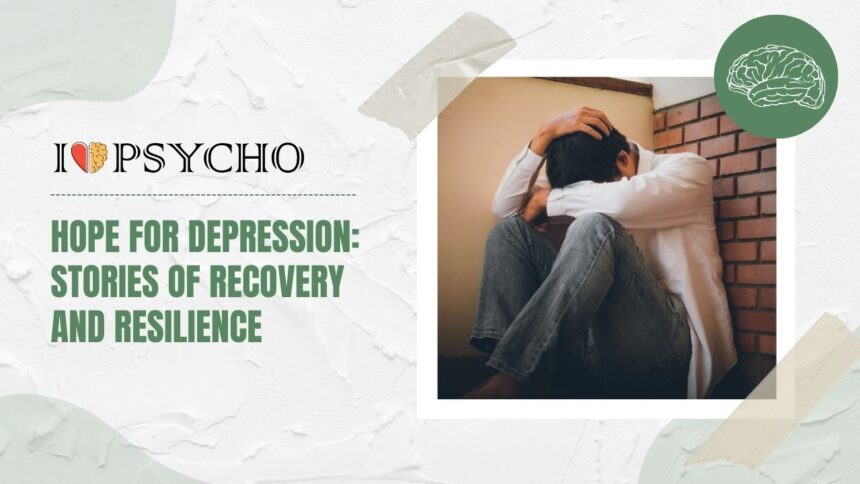Introduction to Depression and its prevalence
Welcome to a journey of hope and resilience in the face of one of the most common mental health challenges: depression. In a world where the weight of daily life can feel overwhelming, it’s important to shine a light on stories of recovery that remind us that there is always a way out of the darkness. Join us as we explore personal accounts, treatment options, and strategies for managing depression with courage and strength. Let’s dive into a realm where hope conquers despair.
The importance of seeking help and support
Depression can be a heavy burden to carry alone. Seeking help and support is crucial in navigating through the challenges that come with it. It’s okay to not have all the answers or solutions on your own, and reaching out for assistance is a sign of strength, not weakness.
Talking to a therapist or counselor can provide valuable insights and coping strategies tailored to your unique experience. Opening up about your feelings with trusted friends or family members can also offer comfort and understanding during difficult times.
Remember, you don’t have to face depression by yourself. There are support groups, hotlines, and online resources available for those seeking guidance and connection. Asking for help is the first step towards healing and finding hope amidst the darkness of depression.
Personal stories of individuals who have recovered from depression
Depression can be a lonely and overwhelming experience, but there is hope. Many individuals have bravely faced their struggles and successfully overcome depression. One such person is Sarah, who battled with deep sadness for years before reaching out for help. Through therapy and support from loved ones, she gradually learned to manage her emotions and rediscover joy in life.
Another inspiring story comes from David, who experienced debilitating anxiety alongside depression. With the guidance of a skilled therapist, he developed coping strategies that empowered him to regain control over his mental health. It wasn’t easy, but David’s determination paid off as he found inner peace and stability once again.
These personal stories remind us that recovery from depression is possible with patience, perseverance, and the right support system in place. Each journey may be different, but they all share a common thread of resilience and courage in the face of adversity.
The role of therapy in treating depression
Therapy plays a crucial role in treating depression by providing individuals with a safe space to explore their thoughts and emotions. Through therapy, people can gain insight into the root causes of their depression and learn coping mechanisms to manage it effectively. Therapists offer support, guidance, and tools to help individuals navigate through their struggles and work towards healing.
Cognitive-behavioral therapy (CBT) is one popular approach that helps patients identify negative thought patterns and behaviors contributing to their depression. By challenging these patterns and replacing them with more positive ones, CBT empowers individuals to change how they perceive and react to situations.
Additionally, psychotherapy can assist in improving communication skills, building self-esteem, and fostering healthier relationships. It’s essential for those struggling with depression to seek professional help through therapy as part of their treatment plan.
Alternative forms of treatment and their effectiveness
Have you considered exploring alternative forms of treatment for depression? While therapy and medication are commonly used, there are other options worth exploring. Some individuals find relief through practices like yoga, meditation, or acupuncture. These holistic approaches can help manage symptoms and promote overall well-being.
Art therapy is another creative outlet that has shown promising results in improving mood and self-expression. Engaging in artistic activities can provide a sense of accomplishment and serve as a form of emotional release. Additionally, spending time in nature or practicing mindfulness techniques can help calm the mind and reduce stress levels.
It’s important to remember that what works for one person may not work for another. It’s about finding the right combination of treatments that resonate with you personally. Don’t be afraid to explore different avenues until you find what brings you comfort and healing during your journey towards recovery from depression.
Tips for managing depression on a daily basis
Living with depression can be challenging, but there are ways to manage it on a daily basis. Developing a routine that includes regular exercise can help boost your mood and reduce symptoms of depression. Whether it’s going for a walk, practicing yoga, or dancing in your living room, physical activity can make a difference.
Eating a balanced diet rich in fruits, vegetables, whole grains, and lean proteins is important for both your physical and mental health. Avoiding excessive caffeine and alcohol consumption can also help stabilize your mood. It’s essential to prioritize getting enough sleep each night as lack of sleep can worsen depressive symptoms.
Practicing mindfulness techniques such as meditation or deep breathing exercises can help you stay grounded and present in the moment. Connecting with supportive friends or family members who understand what you’re going through can provide comfort and encouragement during tough times. Remember to be kind to yourself and seek professional help if needed.
The Impact of Depression on Individuals and Society
Depression doesn’t discriminate; it affects individuals from all walks of life, impacting their relationships, work performance, and overall well-being. The weight of depression can feel overwhelming, leading to feelings of isolation and hopelessness. It’s not just a personal battle but also ripples through society, affecting productivity and healthcare costs.
For individuals, depression can cloud every aspect of daily life. Simple tasks become daunting challenges while maintaining social connections feels like an uphill climb. In the broader context of society, untreated depression contributes to absenteeism in the workplace and strains on healthcare systems.
The stigma surrounding mental health often prevents people from seeking help, perpetuating the cycle of suffering for both individuals and society at large. By understanding the impact of depression on both levels, we can begin to address this complex issue with compassion and support.
Strategies and Resources for Managing Depression
Strategies and resources for managing depression are essential tools in the journey towards healing. One effective strategy is developing a routine that includes activities you enjoy and finding purpose in daily tasks. Engaging in regular exercise not only benefits your physical health but also boosts your mood by releasing endorphins.
Another valuable resource is seeking professional help from therapists or counselors who can provide support and guidance tailored to your specific needs. Cognitive-behavioral therapy (CBT) has shown significant success in treating depression by challenging negative thought patterns and replacing them with more positive ones.
In addition, mindfulness practices such as meditation and yoga can help cultivate self-awareness and promote relaxation. Connecting with others through support groups or online communities offers a sense of belonging and understanding, reducing feelings of isolation.
Exploring creative outlets like art, music, or writing can serve as therapeutic expressions of emotions. Remember, it’s okay to ask for help when needed – reaching out to loved ones or helplines can provide comfort during difficult times.
Breaking the Stigma Surrounding Mental Health
Breaking the stigma surrounding mental health is crucial in creating a supportive environment for those struggling with conditions like depression. It’s time to shift the narrative from shame and secrecy to openness and understanding. By sharing our stories and experiences, we can show that seeking help is a sign of strength, not weakness.
Educating ourselves and others about mental health is key to dispelling myths and misconceptions. Let’s challenge harmful stereotypes and promote empathy and compassion towards those facing mental health challenges. Everyone deserves to be treated with dignity and respect, regardless of their struggles.
Encouraging open conversations about mental health can pave the way for destigmatization. When we speak up without fear or judgment, we create space for healing and acceptance. Together, we can break down barriers and foster a culture of support where mental well-being is prioritized.
Let’s advocate for policies that promote access to quality mental healthcare without discrimination or prejudice. Every individual should have the right to seek help without fear of being stigmatized or marginalized. It’s time to stand united in breaking the silence around mental health issues.
Conclusion: Never Lose Hope in the Face of Depression
Remember, depression is a tough battle, but it’s one that can be won. With the right support, treatment, and mindset, recovery is possible. By sharing stories of resilience and highlighting the importance of seeking help, we can break the stigma surrounding mental health.
If you or someone you know is struggling with depression, remember that there is hope. Reach out for help, talk to a therapist or counselor, explore alternative treatments if needed – whatever it takes to start your journey towards healing.
Above all else, never lose hope in the face of depression. You are not alone in this fight and brighter days are ahead. Stay strong and keep moving forward – recovery is possible!









